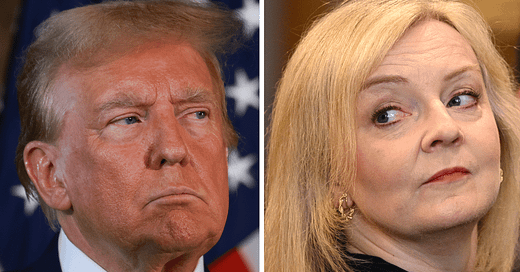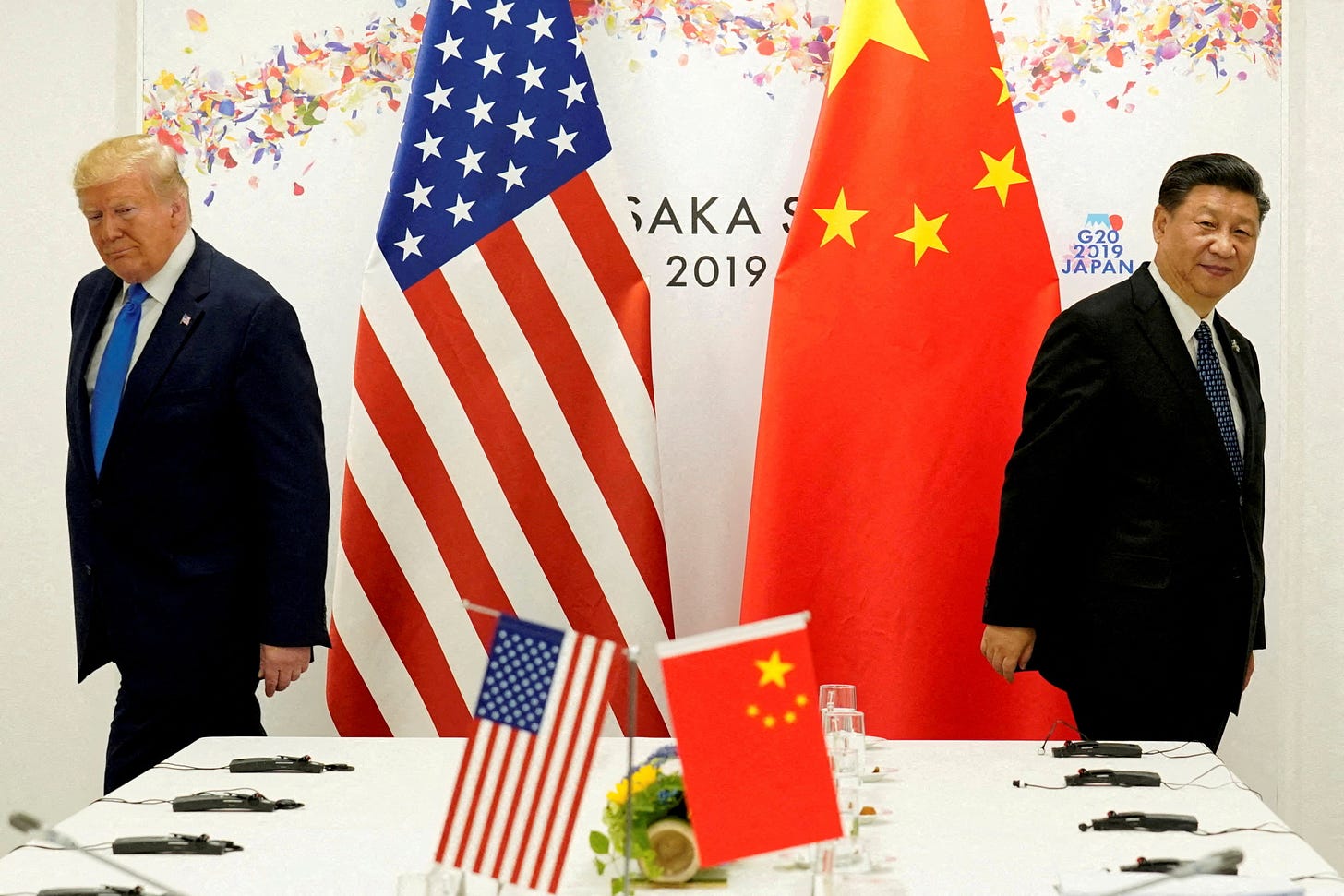Again and again, Trump misunderstands the limits of American power.
And as a result is taking us to a global financial precipice.
There’s an old saying about financial market crises: “"The four most dangerous words in investing are: 'This time it’s different.'" This time it might be. We should be very worried about the contagion taking place in financial markets right now, which began barely a week ago with Trump’s tariff announcement.
The direct effects on the economy have been well rehearsed. Inflation will rise (it has already done so in several markets), capital will be misallocated, supply chains will become more inefficient, productivity growth will lessen. These are largely medium term problems, akin to a puncture in a tyre: difficult, unwelcome- over time manageable. The correction to global stock markets is bad, wiping trillions of value off global equities- but again there is the possibility of a counter-correction over time, and they have a buffer of a very sustained rise over some years. To extend the vehicle metaphor, the car (the economy) will simply be slower (grow less) than it would have done. Bad but not catastrophic.
But the big systemic danger is what is happening in the US bond market. Something very unusual is happening to US government debt: typically, in any moment of economic crisis, the demand for US bonds (Treasuries) goes up. Investors rush to the dollar as a heaven of economic value and safety. Right now the opposite is happening, demand for treasuries is getting weaker. Former US Treasury secretary Larry Summers tweeted that “this highly unusual pattern suggests a generalised aversion to US assets in global financial markets. We are being treated by global financial markets like a problematic emerging market.” As of Wednesday afternoon, the markets were pricing 30 year Greek bonds as a less risky investment than American ones. The markets are moving with their feet.
This is all reminiscent of the dross Liz Truss mini-Budget which ended her mini-premiership, but on an epic scale. US bonds (or Securities, as they’re known) are the linchpin of the global financial system. They are used as collateral in all manner of investments, for trillions of dollarsworth of transactions every day. They are underwritten into trillions of dollars worth of pension fund balance sheets. If the market moves and investors and states decide that dollars and securities are no longer the safest asset there can be, we could see yet another cosmic reordering of yet another global system, at Trump’s hand. US government bonds are seen as one of the safest investments in the world, and many countries, banks, and institutions rely on them to store value and manage risk. If confidence in these securities collapsed, it could trigger sharp sell-offs, drive up borrowing costs for the US, and cause panic across global markets. Currencies, trade, and financial flows tied to the US economy would be disrupted, potentially leading to a worldwide financial crisis.. This will especially be the case if China, reeling from th economic warfare the Trump administration is waging, decide to start to sell US securities, to put the dollar and American debt financing under pressure. The Chinese state owns over £700bn worth of US securities, second only to Japan.
We are not in a rout territory yet, but it is, however gingerly entered, uncharted all the same. Much of the problem here, as is often the case, is centred in Trump’s own profound ignorance. He is a businessman but he has little conception of or interest in the profound interconnectedness of the American financial system. It is also rooted in something we see repeatedly: in Trump’s misunderstanding of the limits of American power. Trump has spent a career avoiding the financial consequences of his own actions because he believed he was too big to fail, and convinced banks and investors of it as well. He thinks America is the same. That it is so dominant and hegemonic that it can act without consequence to itself, or at the least with minimal consequences compared to others. He has this same read with regards to geopolitics- he thinks America is powerful enough to act without allies and with complete freedom of action. This is untrue, and America will be paying the price for these last weeks for years to come in its diplomatic and political standing; future US presidents will have less power than they would have done because of Trump and his evisceration of trust. As it is in diplomacy, so it is in economics.
The US is an economic superpower. But its economic power, like its political power, relied on its relationships with the rest of the world and structures it had built, rather than the power it might only wield itself. Trump does not follow through on his own logic. Yes, America does run a substantial trade deficit. How is that financed? Through the interconnectedness of the global economy: the kindness of strangers and the value investors have placed on the US as an investment destination. Because of its powerhouse economy, vast consumer market, ease of doing business and educated workforce, the US has remained the biggest destination for international investment. Its dollar reserve currency status has made it the natural place for foreigners to put their money, in denomination and geography. This has made America rich and facilitated easy to finance debt. Now Trump has undermined these pillars and suddenly (ironically) actually made the trade deficit he has always claimed it was. Consider that US federal government must refinance $9 trillion in sovereign debt maturities this year plus another $2.5 trillion in fresh borrowing. Foreign investors mop up a lot of that. Will they now? And if they do, at what cost? How high could the US government spending deficit climb? How long before that itself comes to be seen as unsustainable, especially of the dollar reserve status is imperilled? As ever, with Trump he poses new questions, with darkly muttered answers. One way or another, America cannot escape the limitations and strictures the global economy places on every nation, even the most powerful. Trump may be done with globalism: globalism may not be done with him.
Trump has vanquished virtually all of the impediments on his domestic political power: the Democrats, the Congress, the old Resistance, even (in the main) the Courts. He was king in all but name. But even kings have to finance their debts. The markets, ironically enough, are now the biggest threat to the old businessman’s authority, the only real alternative power centre. No American President has had to think much about them before, certainly not since the American postwar economic hegemony. But maybe this time it’s different.






Trump’s used Chapter 11 bankruptcy on at least 6 occasions in the past. Why would anybody think he’d have a clue about basic economics, let alone the global markets?
Trump's philosophy seems to be that the world needs the US more than the US needs the world. It is the dream of the American homesteader to be self-sufficient and live off-grid with a shotgun to keep uppity neighbours at bay.